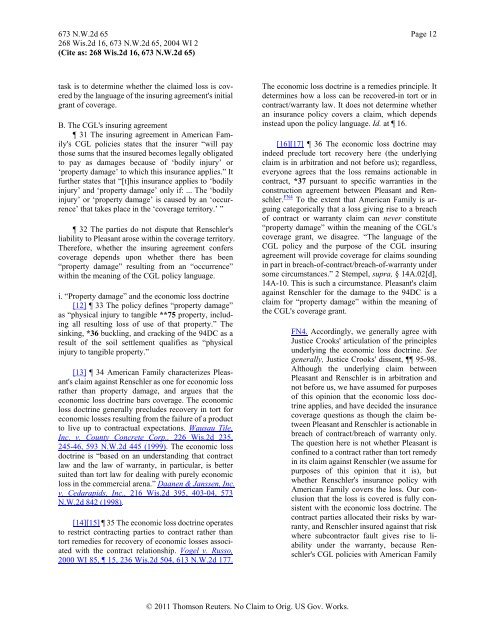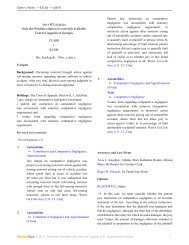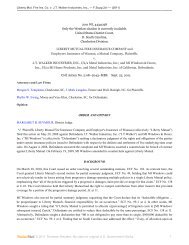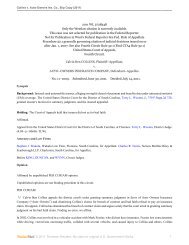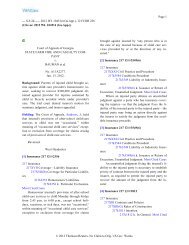American Family Mutual Ins. Co. v. American Girl - Insurance ...
American Family Mutual Ins. Co. v. American Girl - Insurance ...
American Family Mutual Ins. Co. v. American Girl - Insurance ...
Create successful ePaper yourself
Turn your PDF publications into a flip-book with our unique Google optimized e-Paper software.
673 N.W.2d 65 Page 12<br />
268 Wis.2d 16, 673 N.W.2d 65, 2004 WI 2<br />
(Cite as: 268 Wis.2d 16, 673 N.W.2d 65)<br />
task is to determine whether the claimed loss is covered<br />
by the language of the insuring agreement's initial<br />
grant of coverage.<br />
B. The CGL's insuring agreement<br />
31 The insuring agreement in <strong>American</strong> <strong>Family</strong>'s<br />
CGL policies states that the insurer “will pay<br />
those sums that the insured becomes legally obligated<br />
to pay as damages because of ‘bodily injury’ or<br />
‘property damage’ to which this insurance applies.” It<br />
further states that “[t]his insurance applies to ‘bodily<br />
injury’ and ‘property damage’ only if: ... The ‘bodily<br />
injury’ or ‘property damage’ is caused by an ‘occurrence’<br />
that takes place in the ‘coverage territory.’ ”<br />
32 The parties do not dispute that Renschler's<br />
liability to Pleasant arose within the coverage territory.<br />
Therefore, whether the insuring agreement confers<br />
coverage depends upon whether there has been<br />
“property damage” resulting from an “occurrence”<br />
within the meaning of the CGL policy language.<br />
i. “Property damage” and the economic loss doctrine<br />
[12] 33 The policy defines “property damage”<br />
as “physical injury to tangible **75 property, including<br />
all resulting loss of use of that property.” The<br />
sinking, *36 buckling, and cracking of the 94DC as a<br />
result of the soil settlement qualifies as “physical<br />
injury to tangible property.”<br />
[13] 34 <strong>American</strong> <strong>Family</strong> characterizes Pleasant's<br />
claim against Renschler as one for economic loss<br />
rather than property damage, and argues that the<br />
economic loss doctrine bars coverage. The economic<br />
loss doctrine generally precludes recovery in tort for<br />
economic losses resulting from the failure of a product<br />
to live up to contractual expectations. Wausau Tile,<br />
Inc. v. <strong>Co</strong>unty <strong>Co</strong>ncrete <strong>Co</strong>rp., 226 Wis.2d 235,<br />
245-46, 593 N.W.2d 445 (1999). The economic loss<br />
doctrine is “based on an understanding that contract<br />
law and the law of warranty, in particular, is better<br />
suited than tort law for dealing with purely economic<br />
loss in the commercial arena.” Daanen & Janssen, Inc.<br />
v. Cedarapids, Inc., 216 Wis.2d 395, 403-04, 573<br />
N.W.2d 842 (1998).<br />
[14][15] 35 The economic loss doctrine operates<br />
to restrict contracting parties to contract rather than<br />
tort remedies for recovery of economic losses associated<br />
with the contract relationship. Vogel v. Russo,<br />
2000 WI 85, 15, 236 Wis.2d 504, 613 N.W.2d 177.<br />
© 2011 Thomson Reuters. No Claim to Orig. US Gov. Works.<br />
The economic loss doctrine is a remedies principle. It<br />
determines how a loss can be recovered-in tort or in<br />
contract/warranty law. It does not determine whether<br />
an insurance policy covers a claim, which depends<br />
instead upon the policy language. Id. at 16.<br />
[16][17] 36 The economic loss doctrine may<br />
indeed preclude tort recovery here (the underlying<br />
claim is in arbitration and not before us); regardless,<br />
everyone agrees that the loss remains actionable in<br />
contract, *37 pursuant to specific warranties in the<br />
construction agreement between Pleasant and Renschler.<br />
FN4 To the extent that <strong>American</strong> <strong>Family</strong> is arguing<br />
categorically that a loss giving rise to a breach<br />
of contract or warranty claim can never constitute<br />
“property damage” within the meaning of the CGL's<br />
coverage grant, we disagree. “The language of the<br />
CGL policy and the purpose of the CGL insuring<br />
agreement will provide coverage for claims sounding<br />
in part in breach-of-contract/breach-of-warranty under<br />
some circumstances.” 2 Stempel, supra, § 14A.02[d],<br />
14A-10. This is such a circumstance. Pleasant's claim<br />
against Renschler for the damage to the 94DC is a<br />
claim for “property damage” within the meaning of<br />
the CGL's coverage grant.<br />
FN4. Accordingly, we generally agree with<br />
Justice Crooks' articulation of the principles<br />
underlying the economic loss doctrine. See<br />
generally, Justice Crooks' dissent, 95-98.<br />
Although the underlying claim between<br />
Pleasant and Renschler is in arbitration and<br />
not before us, we have assumed for purposes<br />
of this opinion that the economic loss doctrine<br />
applies, and have decided the insurance<br />
coverage questions as though the claim between<br />
Pleasant and Renschler is actionable in<br />
breach of contract/breach of warranty only.<br />
The question here is not whether Pleasant is<br />
confined to a contract rather than tort remedy<br />
in its claim against Renschler (we assume for<br />
purposes of this opinion that it is), but<br />
whether Renschler's insurance policy with<br />
<strong>American</strong> <strong>Family</strong> covers the loss. Our conclusion<br />
that the loss is covered is fully consistent<br />
with the economic loss doctrine. The<br />
contract parties allocated their risks by warranty,<br />
and Renschler insured against that risk<br />
where subcontractor fault gives rise to liability<br />
under the warranty, because Renschler's<br />
CGL policies with <strong>American</strong> <strong>Family</strong>


